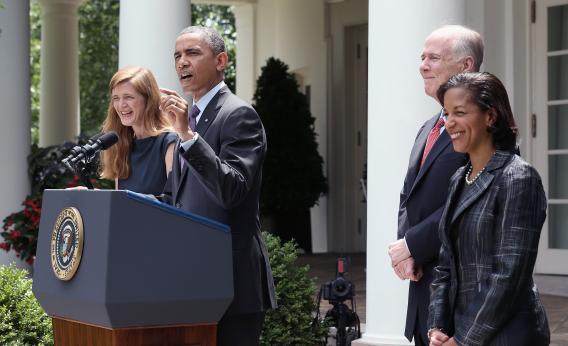Samantha Power's Chuck Hagel Moment

Photo by Alex Wong/Getty Images
After she was nominated to replace Susan Rice as U.S. ambassador to the United Nations, a video from 2002 of Samantha Power advocating Palestinian sovereignty that she has since disavowed is grist for conservative outrage—it's No. 2 on the Washington Free Beacon's "Samantha Power's Five Worst Statements".
In the video, Harry Kreisler, who now heads the Institute of International Studies at UC-Berkeley, asks Power how she would address the Palestinian-Israeli conflict if she were an adviser to the president.
Here's how the interview begins:
Kreisler: Let me give you a thought experiment here without asking you to address the Palestine-Israel problem. Let's say you were an adviser to the president of the United States. How would, in response to current events, would you advise him to put a structure in place to monitor that situation, lest one party or another be looking like they might be moving toward genocide?
Power: Well, I don't think that in any of the cases a shortage of information is the problem, and I actually think in the Palestine-Israeli situation there's an abundance of information. What we don't need is some kind of early warning mechanism there. What we need is a willingness to actually put something on the line in service of helping the situation. And putting something on the line might mean alienating a domestic constituency of tremendous political and financial import. It may more crucially mean sacrificing or investing I think more than sacrificing literally billions of dollars not in servicing Israeli's military, but actually in investing in the new state of Palestine.
She went on to disown that comment in 2008 when a writer for MIFTAH, a pro-Palestine sovereignty website, brought up her 2002 comments:
Power herself recognizes that the statement is problematic. "Even I don't understand it," she says. And also: "This makes no sense to me." And furthermore: "The quote seems so weird." She thinks that she made this statement in the context of discussing the deployment of international peacekeepers. But this was a very long time ago, circumstances were different, and it's hard for her to reconstruct exactly what she meant. Anyway, what she she said five years ago is less important that what she wants to say now: She absolutely does not believe in "imposing a settlement." Israelis and Arabs "will negotiate their own peace."
Later she told the MIFTAH interviewer she finds "sickening the claims that raise the suspicion that there is some anti-Semitic undertones to our views." The "tremendous political and financial import" line may well be for Power's confirmation what "Jewish lobby" was for Hagel's—which is to say, a partisan flashpoint that ultimately doesn't do much damage. (It's also worth noting that she has significant neocon support.) So Power may as well get used to those pesky claims.
